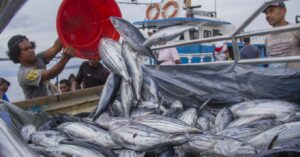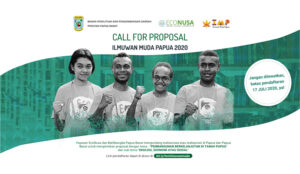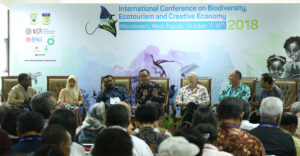
The 2020 yearend is drawing near. However, marine debris seems to be an unending conundrum. It is fresh in our memory images portraying a dead whale with its plastic-filled intestines, plastic straw on a tortoise’s nose, or seahorse with a cotton bud. The documented depiction on mass media represents the scores of the more complicated marine debris cases. Moreover, pandemic that halts human activities along the year does not even work out plastic complication.
According to the scientists’ findings, plastic aroma on sea water creates food-like aroma to sea fauna which then lure them to eat. This is due to the fact that plastic on the ocean serves as habitat for moss, microbe and small creatures that create food-like aroma.
Read also: Youngsters in Ternate Fighting against Sea Debris
The World Economic Forum (WEF) prediction that the amount of marine debris will go beyond fish in the ocean by 2050 might come true only if plastic waste conundrum fails to get to the bottom of the problem. According to Directorate General for Sea and Coastline Damage and Contamination Control of Ministry of Environment and Forestry, the plastic package waste is the most dominant waste in Indonesian sea in 2019. After that, the waste is categorized into bottle cap, plastic bottle, and cigarette buts. Plastic waste with polymer compound could damage coral reef habitat, mangrove, seagrass and poison sea fauna and at the end degrade the quality of sea water.
Plastic waste does not merely belong to urban life with dense population. The islands located hundreds and even thousand kilometers away from the city also is also put at risk of plastic waste. During the trip of EcoNusa Maluku Expedition Route 2 on 7-18 November 2020, EcoNusa team found some distressing facts with the waste polluting coastal and sea areas in Maluku.
In Maluku Island, villages at some islets only have two stalls selling plastic-packaged products. However, the surrounding coastline and water are full of plastic waste which is allegedly flowed by the stream from some other places. In Ameth Village, Nusalaut District, Maluku, one of the destinations of EcoNusa Maluku Expedition, EcoNusa team jointly with the local community could collect at least 10 bags of various waste ranging from food packaging, wire, underwear, sanitary napkin, pampers and cellular phone. In Haruku sea, Maluku, the team found many kinds of plastic packs stuck on the location of transplantation of reef underwater.

Data from Public Work Office on Waste portal for Maluku Island accessed on 18 November 2020, the Public Work Office in Ambon City cleaned up 284.5 kilograms of waste from the beach. The waste in Ternate City was 8.4 tons and 3 percent of the figure is plastic waste.
Involving Various Community Elements in Maluku
Upon visiting villages in Maluku, the expedition team called local community, youngster, and local villagers to clean up plastic waste from the beach. In Rhun Island Village, Banda Island, Central Maluku Regency, dozens of school pupils participated in the cleanup led by Salihi Surahe, Rhun Village Administrative head.

Faradila Dani, a teacher to Gemala Hatta Islamic Senior High School who joined beach cleanup activity with her pupils, said that her school prioritizes cleanliness. The pupils have induced by social collaborative works and keeping environment cleanliness. The school authorities also join the activities.
In addition to Rhun, beach cleanup was also done in Pulau Ay and Ameth Villages. Baileo Maluku’s Program Manager Jefferson Tasik said the joint waste cleanup with EcoNusa Maluku Expedition team involved young people, customary institutions, saniri, kewang (local environment ranger), church community, customary figure, women and field-study students of Kristen Maluku University (UKIM).
“It makes a joyful heart to see clean sea and beach today. It has been three times involving in waste cleanup,” said Ervina Wairisal, one of the field-study students of UKIM participating in the beach cleanup in Ameth. As to her, coastal areas in Ambon City are the compound with the most waste she ever cleaned up.
Waste Hauler Net
In Banda Naira Island, the expedition team utilized net to clean up lagoon from plastic waste. EcoNusa CEO Bustar Maitar said that the community in Banda Island has so far utilized a so-called sero net to collect plastic waste which is proven to be effective.
“EcoNusa jointly with the community in Banda tried to introduce an alternative of using net with wider spread so as to collect more marine debris,” he said.

As to him, the net with large spread here should be tested and evaluated over and over to improve its effectiveness. The net is 10 meters long and 5 meters wide which is hauled by two speedboats.
“We tried this morning and it worked out well,” Bustar said. During the tryout, EcoNusa involved Ridho and Kaka from Slank music group.
Bustar added that every morning during the low tide at Banda lagoon, there are large amount of plastic waste floating despite the small size of the lagoon.
For the reason, it needs collaboration involving the communities to raise community awareness not to dispose waste on the sea. Besides, it also needs cooperation to resolve the problems on the waste that had been disposed on the sea.
He expected the plastic wrap producers to help the community in Banda Island solve marine debris caused by plastic waste that pollutes the sea.
Editor: Leo Wahyudi




